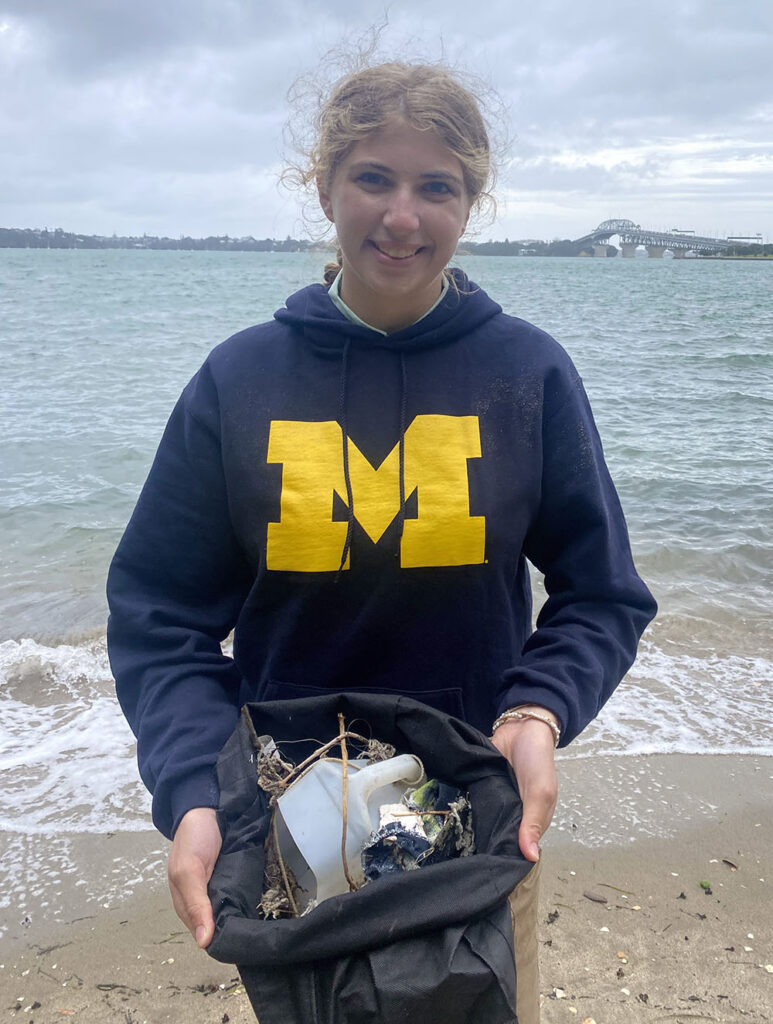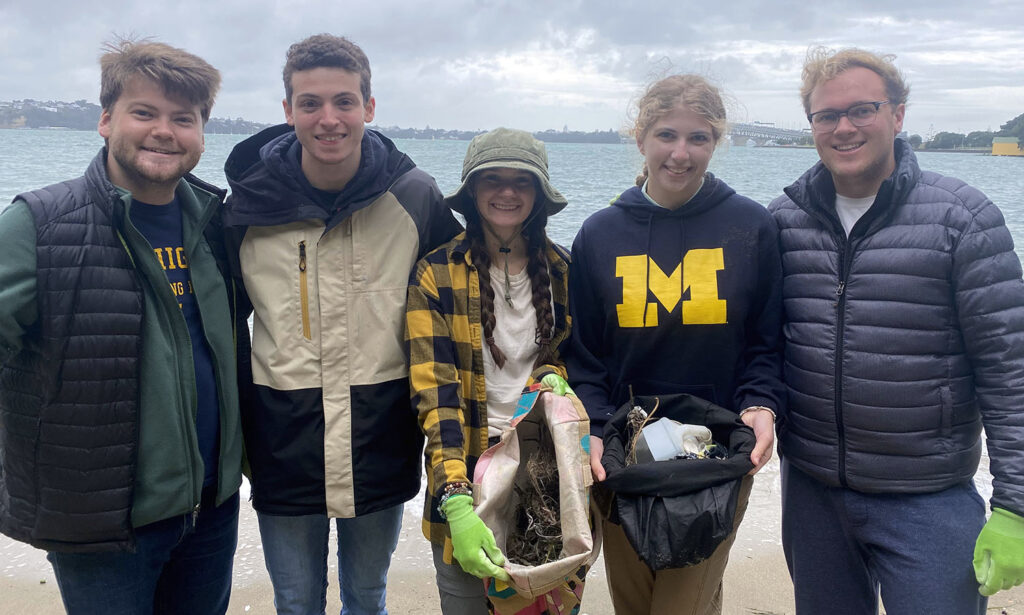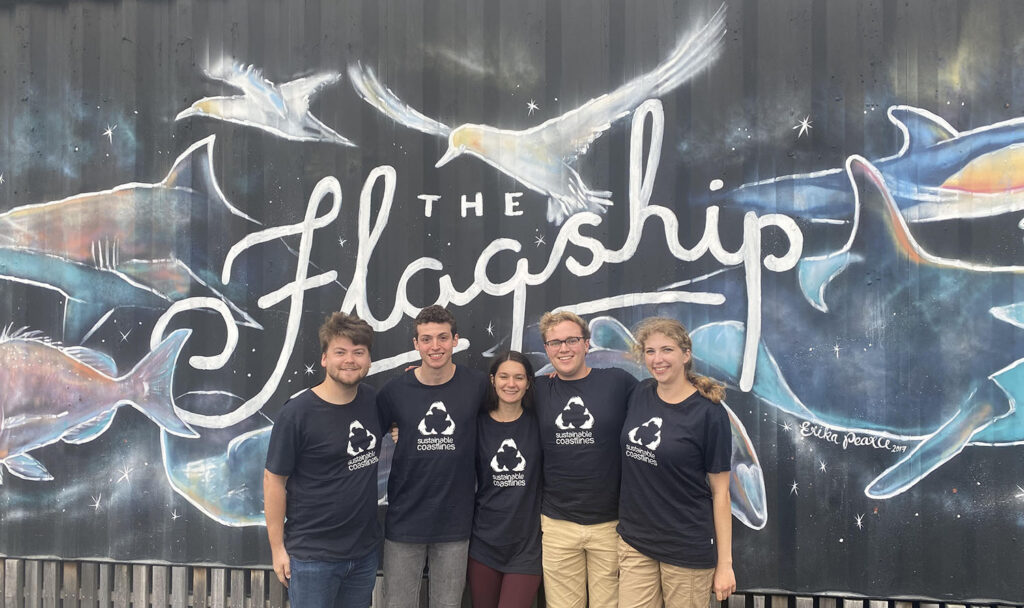Broadening the engineering perspective through coastline conservation in Middle Earth

This past summer, Electrical Engineering undergrad Nora Desmond traveled to the other side of the world to learn more about the environmentally-conscious culture of New Zealand. From cleaning up global trash on local beaches to exploring the iconic mountain vistas made famous by the J.R.R. Tolkien-inspired film franchises, the trip has further inspired her interest in engineering sustainability and addressing the environmental impacts of batteries.
“I went because I wanted to see more of the world, and I specifically wanted to see how different cultures handle different problems in engineering,” Desmond said. “For example, there was a road where you could absolutely not speed, because it was very sensitive to earthquakes. So seeing how they approach that and other problems like water and environmental management, it makes you think, what are they doing, and what are we doing? And what can we do better? Because there’s no one solution in engineering.”
The trip was sponsored by the U-M Engineering Global Leadership (EGL) Honors Program. The abroad experience is a way for engineers to gain global perspective and real-world experience as they volunteer for a local organization. Desmond – and fellow engineering students from Mechanical Engineering, Civil Engineering, and Computer Science and Engineering – worked with Sustainable Coastlines, a local non-profit that works to clean up beaches, prevent litter, and overall connect people with nature.
“Even in a place that is so environmentally conscious and sustainable, they’re still struggling with how to manage something as basic as water,” Desmond said. “I was surprised to find how much litter there was on the New Zealand beaches, but the tides bring in trash from all over the world. In the end, it really does become everybody’s problem.”
In the end, it really does become everybody’s problem.
Nora Desmond
While environmental contamination has severe consequences for health and industry, it can also have devastating impacts on age-old cultural traditions. Native cultures around the world are particularly vulnerable to having their customs disrupted by environmental destruction, and the Maori, the indigenous people of New Zealand, are not exempt.
“Our guide was of Maori descent, and she was telling us that where she grew up, they used to swim in the local rivers,” Desmond said. “But now it’s too polluted. They can’t continue this tradition that’s been in their family for generations.”

Despite the extent of the problem, Desmond was inspired by how Sustainable Coastlines combined real world action – picking up trash – with a strong data-driven focus to help shape national policies for conservation. Through Litter Intelligence, Sustainable Coastlines work in close collaboration with New Zealand’s Ministry for the Environment and Department of Conservation and Statistics to track the flow of litter across ocean currents.
“The litter is very meticulously sorted, counted, and weighed, because that’s the only way lawmakers are going to listen,” Desmond said. “By knowing the precise nature of the litter, you can put policies in place to help control it. It’s a huge step up from where we are in the U.S.”
By knowing the precise nature of the litter, you can put policies in place to help control it. It’s a huge step up from where we are in the U.S.
Nora Desmond
Desmond’s engineering focus has been on developing more sustainable batteries, but her experience learning about the lifecycle of litter impacted her perspective.
“Learning how trash circulates made me think of how we’re still struggling to dispose of batteries, and the environmental hazards because of all the toxic materials and chemicals that go into them,” Desmond said. “Even the mining process for the materials is very, very harmful for the environment. So while I definitely agree that batteries are the next step in sustainability, I can’t imagine they’re the final step, because the way they’re done right now, they’re just not environmentally friendly.”
While the primary purpose of the trip was academic, students also got to explore much of New Zealand’s cities and activities – something Desmond was particularly excited about.
“Ever since reading The Hobbit and Lord of the Rings in middle school, it’s been a dream of mine to go to New Zealand,” Desmond said. “I thought going as a volunteer was a really great opportunity.”
Desmond spent a magical, misty day in Hobbiton, the fictional village originally created as the film set for the epic franchises. She wandered past hobbit-sized gardens, wheelbarrows, and colorfully decorated doors, and the surrounding hillsides were covered with lambs (New Zealand has more sheep per unit area than anywhere else in the world). In Auckland, she and the other members of her program enjoyed the variety of Asian-fusion restaurants between sessions of put-put golf and sailboat outings.
“I wouldn’t have met any of these people had not been for this experience,” Desmond said. “We all came to Michigan for different reasons, yet we all ended up together in New Zealand, which was really cool.”

One of Desmond’s most memorable excursions, however, was in a remote area deep in the South Island of New Zealand. Nestled along the border of Fiordland National Park, Desmond crossed the sparkling Lake Te Anau in a glorified canoe. She and a handful of fellow adventurers were off to explore the twisting limestone passages, the underground waterfalls, and above all, the sparkling wonder of billions of glowworms in the Te Anau Caves.
“They were like little underground stars,” Desmond said. “I’ve never seen anything like it. And getting there was an adventure in and of itself, because there’s no way to get there by road. It’s surrounded by mountains and the lake. Even the guides had to take the boat to get back civilization at the end of the day.”
For Desmond, and perhaps all who travel to the heart of Middle Earth, such experiences exemplify the famous line by the character Bilbo Baggins’ in The Fellowship of the Ring:
“Not all who wander are lost.”
 MENU
MENU 
